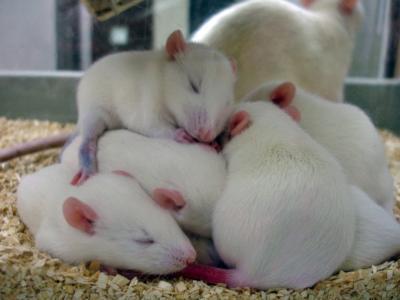Feeling stressed out? Blame your great-grandparents.
Psychologists have linked ancestral exposure by a common fungicide, vinclozolin, to the stress levels of rats generations later. Epigenetically. Vinclozolin is a fungicide commonly used by farmers to ward off rots, molds and blights.
Endocrine disrupting chemicals are found in both natural and human-made materials and some studies have linked them to reproductive issues but it has become more common to invoke epigenetic effects and behavior to endocrine disruption - in this case, stress. The US EPA registered vinclozolin and qualified that it might be a possible human carcinogen. Its manufacturer, BASF, doesn't sell much of it this century, it is primarily used on golf courses and on a few wine grapes.

Maybe epigenetics made these rat pups sleepy. Photo: Andrea Gore.
Scholars from The University of Texas at Austin and Washington State University found that rats whose ancestors had exposure to vinclozolin behaved differently than rats whose great grandparents were not exposed. Female rats were much more vulnerable to stress, becoming more anxious and preferring the company of novel females to familiar females.
Males who had the same combination of ancestral exposure and stress didn't have the same adverse effects.
This is not the first paper to find more harm to females from ancestral environmental effects; it isn't even the first in the last month. A few weeks ago a paper claimed obesity in females was due to parental exposure to DDT.
"These results should concern us all because we have been exposed to endocrine disrupting chemicals for decades and we all go through natural challenges in life," said David Crews, the Ashbel Smith Professor of Zoology and Psychology at The University of Texas at Austin and lead author of the study, who writes a lot for the journal. He had 10 papers in just one issue last year. "Those challenges are now being perceived differently because of this ancestral exposure to environmental contamination."
Crews has practiced his framing. He says we have all been exposed to endocrine disruptors - and we have, in cauliflower and many other vegetables - but doesn't note that unless children are eating golf courses, they have not been exposed to vinclozolin. It dissipates quite radidly in the environment.
To test the effects of stress on rats, the researchers confined some of them to soft, warm cylinders for six hours a day for three weeks. This was done during adolescence. Months later (one month human time is over 3 years for rats) the researchers tested the brain chemistry, brain function, gene expression and behavior of the rats as adults.
Un-stressed female rats with ancestral exposure to vinclozolin showed negligible effects on hormonal balance and behavior. The, the combination of ancestral exposure and stress caused the female rats to have dramatically higher levels of corticosterone (a stress hormone similar to cortisol in humans), higher expression of genes associated with anxiety and more anxious behaviors.






Comments